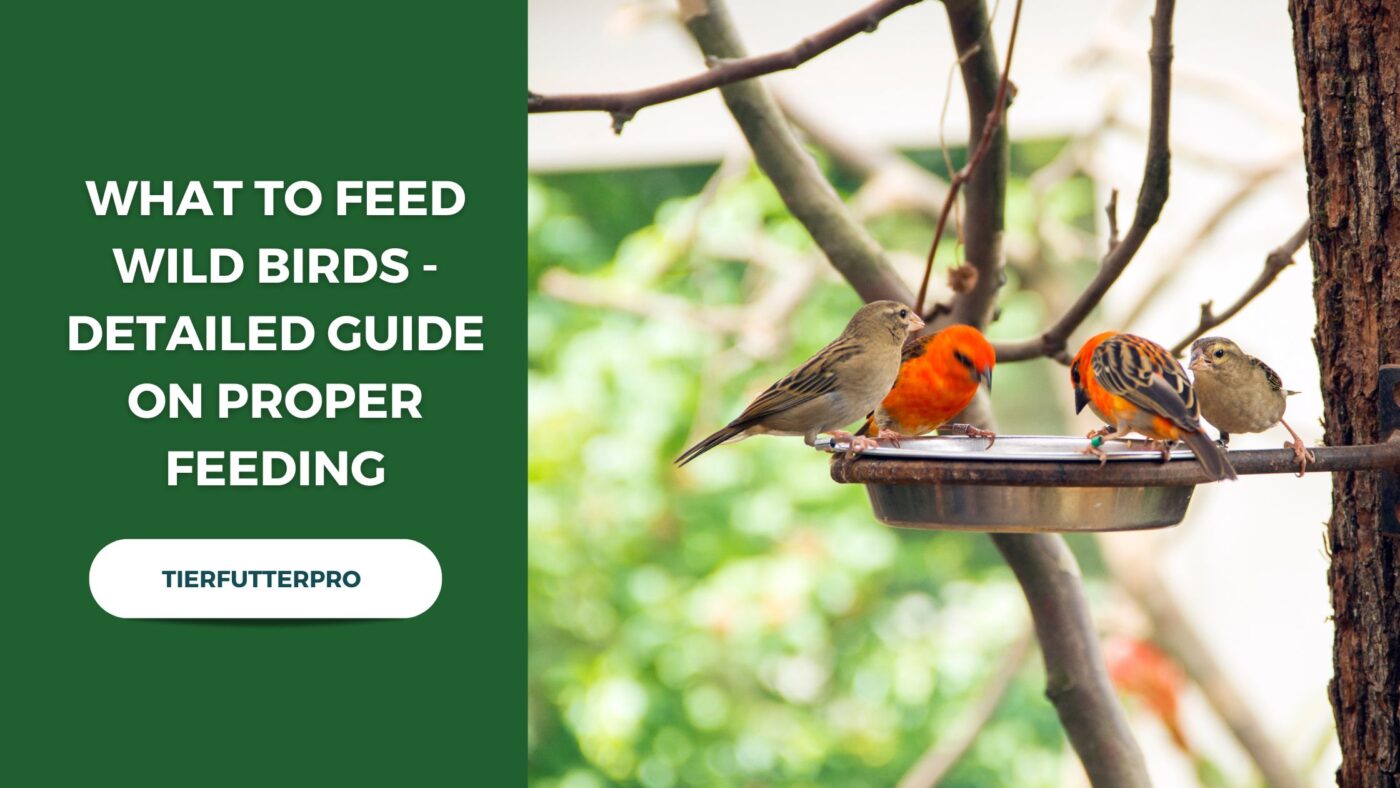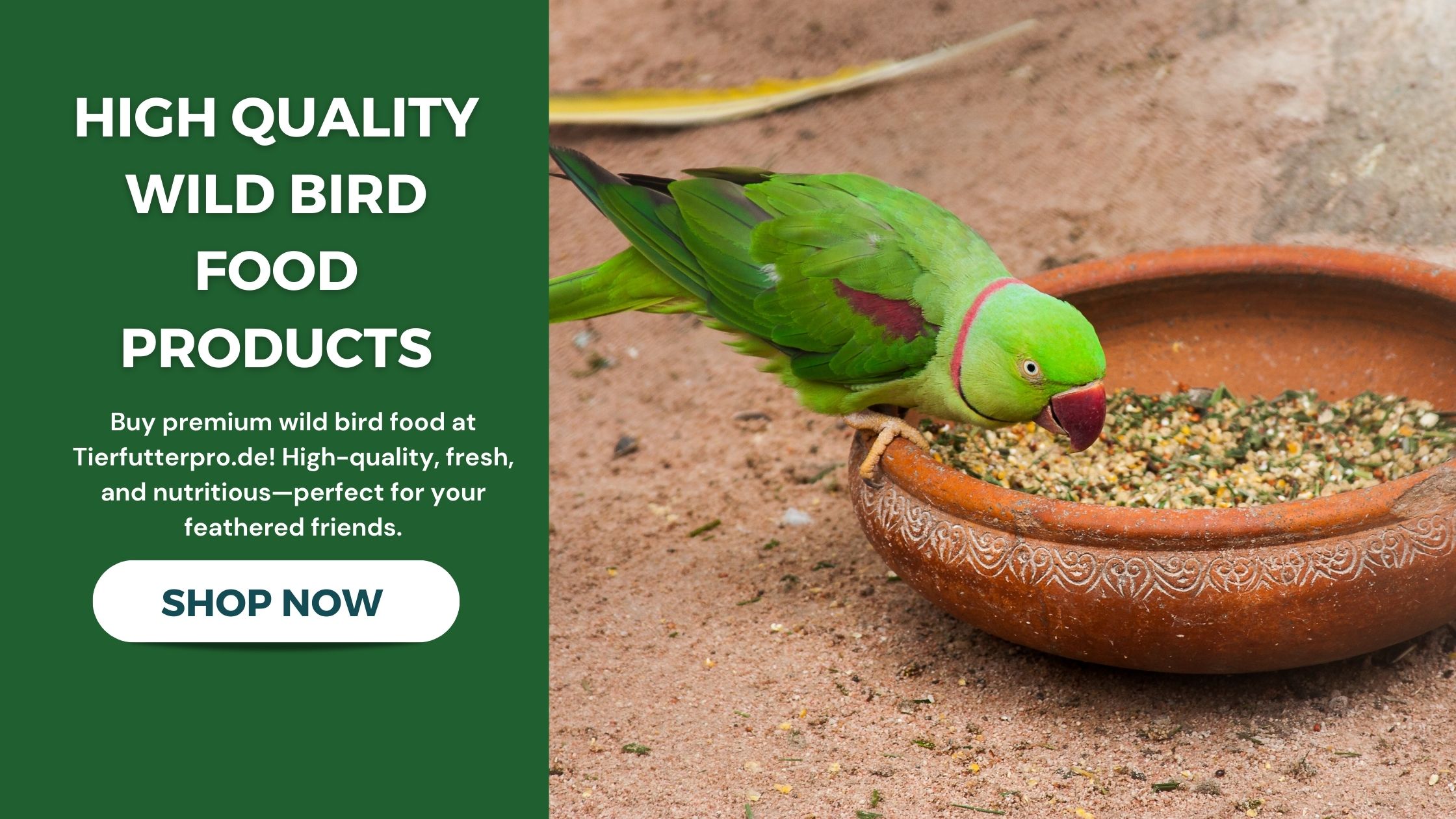Sie bestellen als “Gast”!
Wild Birds
Proper Feeding for Wild Birds: Detailed Guide on What to Feed Them
Wild birds bring beauty to your gardens and outdoor spaces. Offering them the right food not only improves their health but also makes it more likely that different species will come to your backyard.
You can feed them different types of seeds, grains, nuts, peanuts, fruits, berries, mealworms, insects, etc.
This guide tells you everything you need to know about feeding wild birds, such as what kinds of food are safe and healthy, what to keep in mind depending on the season, and what baby birds need to eat.
But what should you feed wild birds? What not to feed them is just as important. Let’s find out everything in detail.
What to Feed Wild Birds: Safe and Nutritious Options
Wild birds have different food needs, so giving them a variety of food helps meet the needs of different species. Here are the best food options for them:
1. Seeds and Grains
One of the best foods for wild birds is high-quality birdseed. Different bird species have different preferences when it comes to seeds.
Black oil sunflower seeds are rich in oil and easy to crack. Hence, you can feed them to cardinals, finches, and chickadees.
Nyjer (thistle) seeds are tiny and packed with energy, attracting goldfinches and siskins. You can feed Millet to ground-feeding birds like sparrows and doves as they are great for them.
Safflower seeds are enjoyed by cardinals and are less attractive to squirrels.
Cracked corn is an inexpensive option suitable for larger birds like jays and doves, while oats and barley are suitable for many ground-feeding birds.
2. Nuts and Peanuts
You can feed nuts and also Peanuts to wild birds as long as they are unsalted and unseasoned. They provide essential protein and fat for birds, especially during colder months.
Woodpeckers, nuthatches, and bluejays particularly enjoy them. It is essential to use peanuts that are free from mold, as fungi can be harmful to birds.
3. Fruits and Berries
Fresh or dried fruits can be a great treat for birds that enjoy a more varied diet, including robins, waxwings, and orioles.
Suitable options include apples cut into small pieces without seeds, bananas, grapes, and raisins that have been soaked to soften, as well as blueberries, raspberries, and other small berries.
4. Suet and Fat Balls
Suet is a high-energy food made from animal fat mixed with seeds, nuts, or fruits. It is especially beneficial in winter when birds need more calories to stay warm.
Suet attracts woodpeckers, starlings, and nuthatches. Always use fresh suet and avoid those containing artificial preservatives or additives.
5. Mealworms and Insects
Insect-eating birds, such as robins, bluebirds, and wrens, thrive on mealworms. These can be offered dried or live for an extra protein boost. Other options include crickets and waxworms.
What Not to Feed Wild Birds: Foods to Avoid
While enthusiasm is great, what not to feed wild birds is just as important as what to offer. Avoid these harmful items:
- Bread, Crackers, or Chips: These items lack nutrition and can cause digestive issues to wild birds.
- Moldy or Spoiled Food: Foods that are moldy or spoiled should never be offered. They cause fatal respiratory infections.
- Processed Foods: Avoid giving salty snacks, sugary cereals, or leftover cooked rice as they expand in birds’ stomachs and can cause discomfort.
- Raw Meat or Dairy: Don’t feed raw meat and dairy items as they promote bacterial growth and are difficult for birds to digest.
- Avocado: It contains persin, a toxin lethal to birds. Hence, you should never feed it to wild birds.
- Chocolate or Caffeine: They are toxic to all wildlife. As a result, you should never offer it to wild birds.
Pro Tip: You should never offer foods with additives, spices, or salt. Stick to natural, unprocessed options.
What to Feed in Different Seasons
Birds require different nutrition depending on the season. Here’s a quick breakdown you should know:
What to Feed Wild Birds in Winter
Winter demands high-energy foods to help birds survive freezing temperatures. You should prioritize:
- Suet cakes and peanut butter (mixed with oats or cornmeal).
- Black oil sunflower seeds for easy cracking.
- Nyjer seeds to sustain finches.
- Heated birdbaths to prevent dehydration.
- Avoid frozen or soggy food—clean feeders regularly to prevent ice buildup.
Spring and Summer Feeding
Breeding season requires protein for nestlings and egg-laying adults. Here are what you can feed them during the spring and summer seasons.
- Mealworms (live or rehydrated).
- Calcium-rich crushed eggshells for strong egg development.
- Fruit halves to hydrate birds during heatwaves.
What to Feed a Wild Baby Bird
If you come across a wild baby bird, its nutritional needs will be determined by its species and age. In most circumstances, it is preferable to leave newborn birds where they are since their parents will continue to feed them.
If intervention is required, you can serve soaking dog or cat food that has been softened and mashed for ease of consuming, moist mealworms broken into little bits for nestlings, or unseasoned and finely chopped scrambled eggs.
Never offer a newborn bird milk, bread, or seeds, since they may be quite harmful. If you’re unsure, ask a wildlife rehabilitator for guidance.
How to Properly Feed Wild Birds
To maximize the benefits of feeding wild birds, you should consider the best practices mentioned below.
- Use proper feeders, such as tube feeders for finches and chickadees, platform feeders for cardinals and doves, suet cages for woodpeckers, and hummingbird feeders for nectar-drinking birds.
- Keep feeders clean by washing them with mild soap and warm water at least once a week, rinsing thoroughly, and allowing them to dry before refilling.
- Provide fresh water for drinking and bathing, using a heated birdbath in winter to prevent freezing.
- You can offer a variety of foods to attract a greater range of bird species and ensure they receive balanced nutrition.
- Be consistent with feeding, especially in winter when birds may come to rely on your food supply.
FAQs: Answering Some Common Bird Feeding Questions
Q: Can birds become dependent on feeders?
A: Studies show birds supplement only 10–20% of their diet from feeders, so dependency is rare.
Q: What can I feed wild birds if I run out of seed?
A: You can feed unsalted peanuts, oatmeal, or chopped fruit (apples, bananas). They are all safe short-term substitutes.
Q: Should I feed wild birds year-round?
A: Yes you should! Consistent feeding helps them during migration, breeding, and even in harsh weather.
Key Takeaways
Knowing what to feed wild birds and what not to feed wild birds ensures your backyard becomes a safe haven.
Whether adjusting diets for winter or rescuing a baby bird, responsible feeding practices make all the difference.
By following these guidelines, you’ll not only attract a wide range of bird species to your backyard but also contribute to their well-being.



super